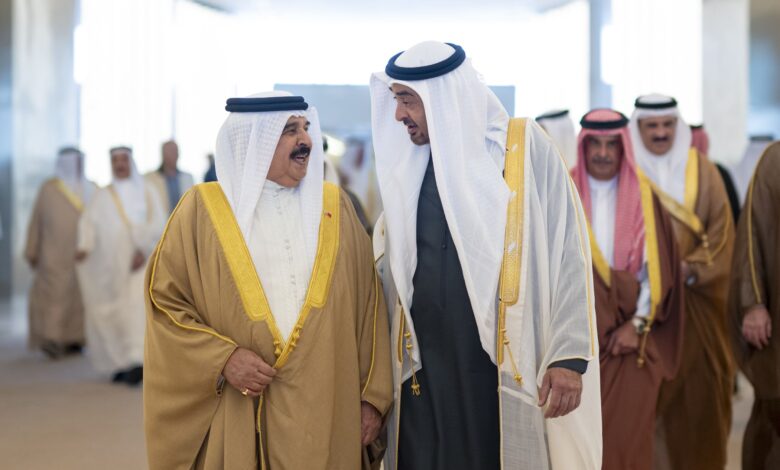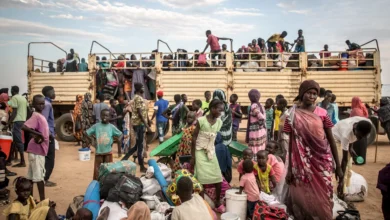
Majestic Welcome: King of Bahrain Honored by UAE President in Abu Dhabi
In a display of diplomatic camaraderie, Abu Dhabi, the capital city of the United Arab Emirates, rolled out the red carpet for King Hamad bin Isa Al Khalifa of Bahrain. The grand welcome, orchestrated by UAE President Sheik Mohamed bin Zayed Al Nahyan, took place at the Presidential Palace, showcasing the strong ties between these two Arabian Gulf nations. This visit has an impact on the ongoing efforts to strengthen regional cooperation and stability in the Middle East.
The royal reception in Abu Dhabi highlights the UAE’s role as a key player in regional diplomacy. It also underscores the importance of bilateral relations between Bahrain and the UAE, which extend beyond political alliances to encompass economic partnerships and cultural exchanges. The meeting between these two leaders is expected to lead to discussions on shared challenges, opportunities for collaboration, and strategies to enhance the prosperity of their nations in an ever-changing global landscape.
Profile of King Hamad bin Isa Al Khalifa
King Hamad bin Isa Al Khalifa, born on January 28, 1950, has been the ruler of Bahrain since 1999. He initially assumed power as Emir and later proclaimed himself King in 2002. His reign has been marked by efforts to modernize Bahrain and implement political reforms. King Hamad’s initiatives include releasing political prisoners, dissolving the State Security Court, and allowing exiled citizens to return. He has also focused on improving living standards and establishing Bahrain as a financial hub. The King’s enlightened vision of peace, tolerance, and coexistence has earned Bahrain international recognition. His efforts in promoting interfaith dialog and harmony have made the country a model of tolerance in the region. However, his rule has also faced challenges, including tensions with the Shi’ite community and protests during the Arab Spring in 2011.
UAE’s Diplomatic Prowess
The United Arab Emirates has established itself as a key player in regional diplomacy, guided by principles set forth by its first President, Sheik Zayed bin Sultan Al Nahyan. These principles include a belief in justice in international dealings, non-interference in other states’ affairs, and the pursuit of peaceful dispute resolutions. The UAE’s diplomatic efforts extend beyond the Arabian Gulf, encompassing the broader Arab world and international stage.
Abu Dhabi has leveraged its oil wealth to invest in infrastructure and federal institutions, bonding a society traditionally divided along tribal, familial, and geographic lines. Under the leadership of Sheik Mohamed bin Zayed Al Nahyan, the UAE has employed a combination of soft and hard power to assert itself in the Middle East and Africa. The country’s goals include supporting secular authoritarian Arab leaders, countering terrorism, and deterring Iran.
The UAE’s foreign policy has evolved to include a more pragmatic approach towards regional neighbors. Recent diplomatic initiatives, such as the visit of UAE National Security Advisor Sheik Tahnoun bin Zayed Al Nahyan to Iran, reflect a shift towards a “zero problem” policy with regional rivals. This approach aims to build bridges of communication, expand diplomatic efforts, and avoid confrontations that could hinder the country’s economic growth in the post-Covid era.
Economic and Cultural Ties
The United Arab Emirates and Bahrain share robust economic ties, rooted in geographical proximity and strong leadership relations. Trade exchange between the two nations has seen remarkable growth, with UAE exporting AED 6.61B to Bahrain in 2022, primarily in gold, jewelry, and raw iron bars. Conversely, Bahrain’s exports to UAE reached AED 7.60B, focusing on iron ore, refined petroleum, and jewelry. The economic relationship extends beyond trade, encompassing joint investments in finance, business, tourism, oil, and energy sectors. Cultural exchange programs and homestays in the UAE offer visitors immersive experiences in Bedouin culture, traditional customs, and local way of life, fostering deeper understanding between the two nations.
The royal welcome extended to King Hamad bin Isa Al Khalifa by UAE President Sheik Mohamed bin Zayed Al Nahyan underscores the strong ties between Bahrain and the UAE. This meeting has an influence on ongoing efforts to boost regional cooperation and stability in the Middle East. The diplomatic prowess of the UAE, coupled with the economic and cultural links between the two nations, sets the stage for fruitful discussions on shared challenges and opportunities for collaboration.
King Hamad’s visit to Abu Dhabi highlights the importance of maintaining and strengthening relationships among Gulf nations in an ever-changing global landscape. The grand reception not only showcases the UAE’s role as a key player in regional diplomacy but also reflects the shared vision of both leaders to enhance the prosperity of their nations. This meeting paves the way to explore new avenues for partnership and to reinforce the existing bonds between Bahrain and the UAE.






